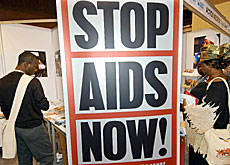Swiss Aids pioneer reflects on progress

The Swiss Aids Federation (SAF) turns 20 next month – ahead of the anniversary, swissinfo spoke to one of its founders, Roger Staub.
Now head of the Federal Health Office’s Aids section, Staub continues to spread the message of Aids prevention across Switzerland and around the world.
In 1985 Staub co-founded the SAF with Herbert Riedener and Marcel Ulmann.
From 1986 to 1997 he was creatively involved with the groundbreaking “Stop Aids” campaigns across Switzerland.
swissinfo: Looking back over the past 20 years, what have been the biggest changes you’ve noticed in your work?
Roger Staub: The major difference is the openness of Swiss society towards sexuality in general – and homosexuality in particular – and drug use. If you showed the slogans we’re producing today to people 20 years ago they would be shocked.
This change was not intended. When we started the Swiss Aids Federation 20 years ago we were motivated to spread the message of prevention first of all to gay men but also to society as a whole. We wanted to pass the message that you should not discriminate against people with HIV/Aids. That was the purpose of the organisation.
swissinfo: Is it possible to measure the success of a campaign and, if so, what makes a campaign successful?
R.S.: Roughly two-thirds of people report using condoms with new sexual encounters. The “Stop Aids” brand is recognised by more than 90 per cent of the population who say the Health Office and the SAF should continue informing the public about HIV/Aids. This is a big success in awareness, in knowledge, in attitude and in behaviour.
I think the secret of “Stop Aids” is that it’s a brand that tells people what the message is. We focus very much on things people can do. Our message for 18 years has been ‘Stop Aids – use condoms’ – a simple, do-able message.
swissinfo: And people in Switzerland have listened?
R.S.: Definitely. Condom use in high-risk situations has risen from eight per cent in 1987 to over 60 per cent.
swissinfo: The latest “Stop Aids” campaign features actress Renée Zellweger and director Marc Forster – big names but both in their mid-30s. Shouldn’t you be using younger figures to target younger audiences?
R.S.: No. I think it’s a myth that one should focus on younger people. Studies show that young people in particular are aware of the problem: they have learnt quite a lot about Aids from school. Not every school is the same because of Switzerland’s federal structure, but in general young people have quite a good knowledge. They also use many more condoms than older people – and when I say older people, condom use with new sexual partners starts to decline after 25, and that’s why I think our focusing on people aged 20-60 is reasonable.
swissinfo: What are the most extreme reactions to the posters?
R.S.: Posters continue to be torn down or covered with graffiti, but I still find these reactions a good thing as they create awareness and discussion.
swissinfo: What do you think of the way the media have reported Aids?
R.S.: I think the media played a crucial role in Switzerland in alerting society and politicians. At first, there were mostly horrible articles about danger and death for everybody. But it became more reasonable and serious in the second half of the 1980s.
For the past ten years, there have only been two stories in the media: the HIV/Aids catastrophe in the developing world, which our society reads as ‘be quiet, it’s not a problem – it’s far away’, and our pharmaceutical industries repeatedly saying ‘we’ve got new medicine, we’ve got new pills’.
People then think that there’s a cure for HIV/Aids. These two messages are dangerous because people become complacent and there is still an HIV/Aids problem in Switzerland.
So we don’t get much support regarding prevention from the media, but I don’t want to beat the media – I understand how they work: the prevention message is 20 years old and we don’t have any new news.
swissinfo: In sub-Saharan Africa, an estimated 25 million people live with HIV and 2.2 million people died from Aids in 2003. What should the rest of the world be doing?
R.S.: It is still vital to do prevention work in Africa, but HIV escaped into the general public 20 years ago there and, in that respect, it’s too late.
Today, Far Eastern, Central Asian and Eastern European countries are where Africa was in the early 1980s. I fear we’ve passed the point of being able to do good work in these countries. If the general public is infected by more than one or two per cent, then it’s very hard to stop the spread of the epidemic.
As for treatment, I agree completely with the World Health Organization’s “3 by 5” initiative [the global target to provide three million people living with HIV/Aids in developing and middle income countries with life-prolonging antiretroviral treatment by the end of 2005]. This is trying to get simple and available treatment to the poor in Africa, who really need it.
The amount of money spent by rich governments on HIV/Aids in the developing world is shameful.
swissinfo-interview: Thomas Stephens
Roger Staub was born in 1957 and grew up in the Zurich Oberland.
In 1985 he founded, with Herbert Riedener and Marcel Ulmann, the Swiss Aids Federation.
He is now head of the Federal Health Office’s Aids section and is programme manager for the national HIV/Aids programme 2004-2008.

In compliance with the JTI standards
More: SWI swissinfo.ch certified by the Journalism Trust Initiative













You can find an overview of ongoing debates with our journalists here . Please join us!
If you want to start a conversation about a topic raised in this article or want to report factual errors, email us at english@swissinfo.ch.